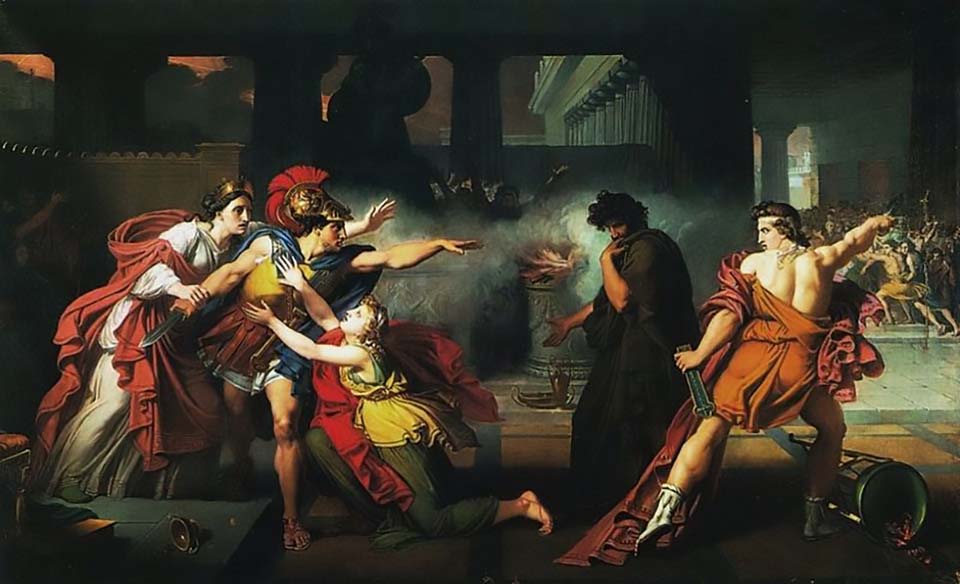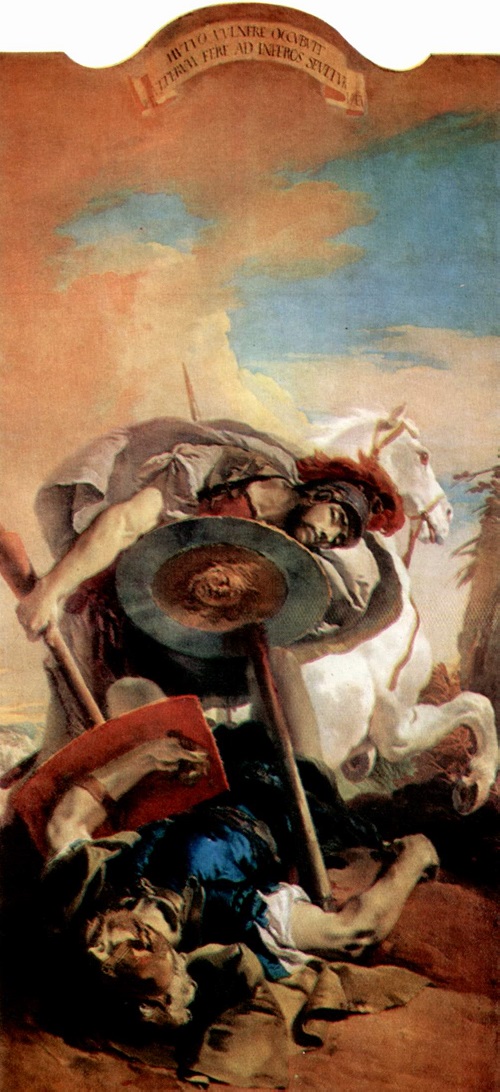Eteocles
In Greek mythology, Eteocles (Ancient Greek: Ἐτεοκλῆς, meaning: "truly glorious") was a king of Thebes, the son of Oedipus and either Jocasta or Euryganeia.
Oedipus killed his father Laius and married his mother without knowing his relationship to either. When the relationship was revealed, he was expelled from Thebes.
Oedipus would curse his two sons, proclaiming that neither Eteocles nor Polynices would peacefully, or successfully, become king of Thebes. Oedipus was then exiled from Thebes by his own sons.
To try and circumvent Oedipus’ curse, Eteocles and Polynices agreed to share the rule of Thebes, with each brother ruling in alternate years.
Eteocles would rule Thebes in the first year, but at then of that year, Eteocles refused to yield the throne to Polynices, breaking the promise made between the brothers. Eteocles, who had the support of the Theban people, forced Polynices into exile. Whilst King of Thebes, Eteocles would become father to a son, Laodamas, by an unnamed woman.
There are several accounts of how Eteocles and Polynices shared the rule after Oedipus's departure from the city. In Hellanicus's account, Eteocles offers his brother his choice of either the rule of the city or a share of the property. In Pherecydes, however, Eteocles expels Polynices by force, and keeps the rule of Thebes and the inheritance.
The Bibliotheca and Diodorus state that the brothers agree to divide the kingship between them, switching each year. Eteocles, however, was allotted the first year, and refused to surrender the crown.
Whilst the rule of Eteocles continued, Polynices had found refuge in Argos, where he also found allies in his cause, including King Adrastus. With the belief that Polynices was the rightful ruler of Thebes, an Argive army was raised. Thus, the war known as the Seven Against Thebes began.

Now, Eteocles may have broken a promise, but Polynices had now raised a foreign army to invade Thebes, something which could only bring about death and destruction for the kingdom he sought to rule.
Before any fighting took place, Tydeus, came from the Argive force, to ask for Eteocles to yield, but Eteocles refused.
The Seven commanders of the Argive army lined their forces up against the seven gates of Thebes; and each of the seven gates of Thebes was defended by a named defender.
Thus, it was, that the gate that Polynices faced was defended by Eteocles.
When battle commenced forces on both sides were decimated, and eventually it was decided that the war should be brought to a close after a single-combat fight between Eteocles and Polynices.
When Eteocles and Polynices fought they ended up killing each other.
Though not a decisive end to the war, the surviving Argive forces withdrew, for the Seven, aside from Adrastus, were now dead, and the walls of Thebes still stood firm.
Laodamas was too young to rule, and so in his stead, Creon, became regent of Thebes, although, when, ten years later, the Epigoni came to Thebes, Laodamas was indeed king.

Sources
Apollodorus, 3.7.2.
Pausanias, 2.20.5.
Apollodorus, 3.7.2.
Apollodorus, 3.7.3.
Pausanias, 7.3.1, 9.9.4.
Pausanias, 9.5.13, 9.9.5.
Pausanias, 9.5.14.
Herodotus, 4.32.1.
Robin Hard. The Routledge Handbook of Greek Mythology (2004)
Hoffner, p. 297. - Hoffner, Beckman. Letters from the Hittite Kingdom. Atlanta: Society of Biblical Literature, 2009.
Gantz, p. 502. - Gantz, Timothy. Early Greek Myth. Baltimore: Johns Hopkins University Press, 1993
Gantz, p. 503. - Gantz, Timothy. Early Greek Myth. Baltimore: Johns Hopkins University Press, 1993
Sophocles. Oedipus at Colonus, lines 1350-1395.
Pseudo-Apollodorus. The Library, 3.6.1.













